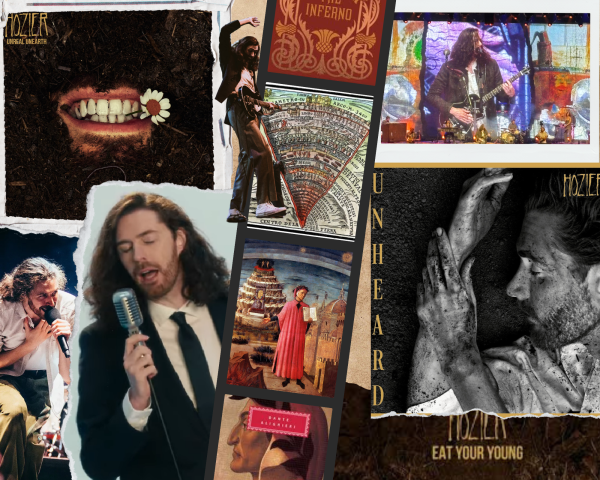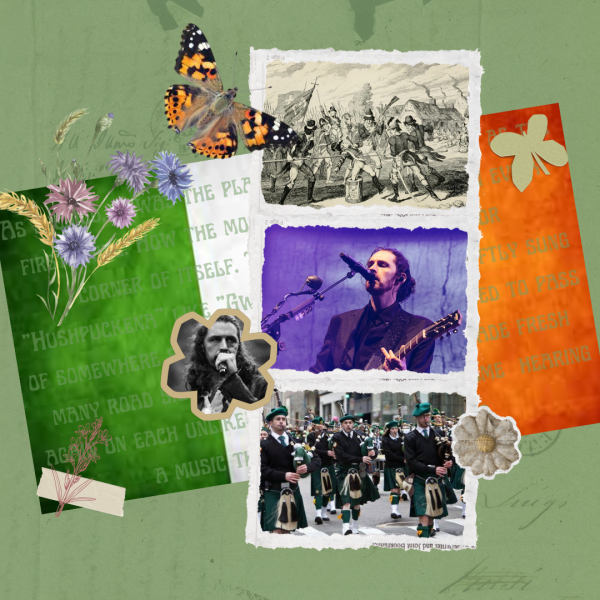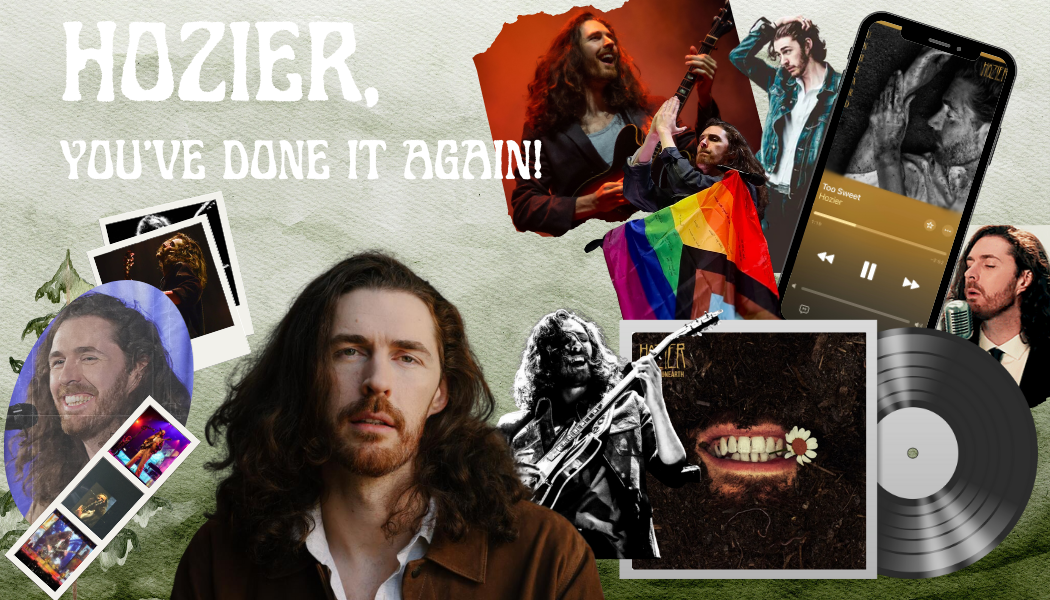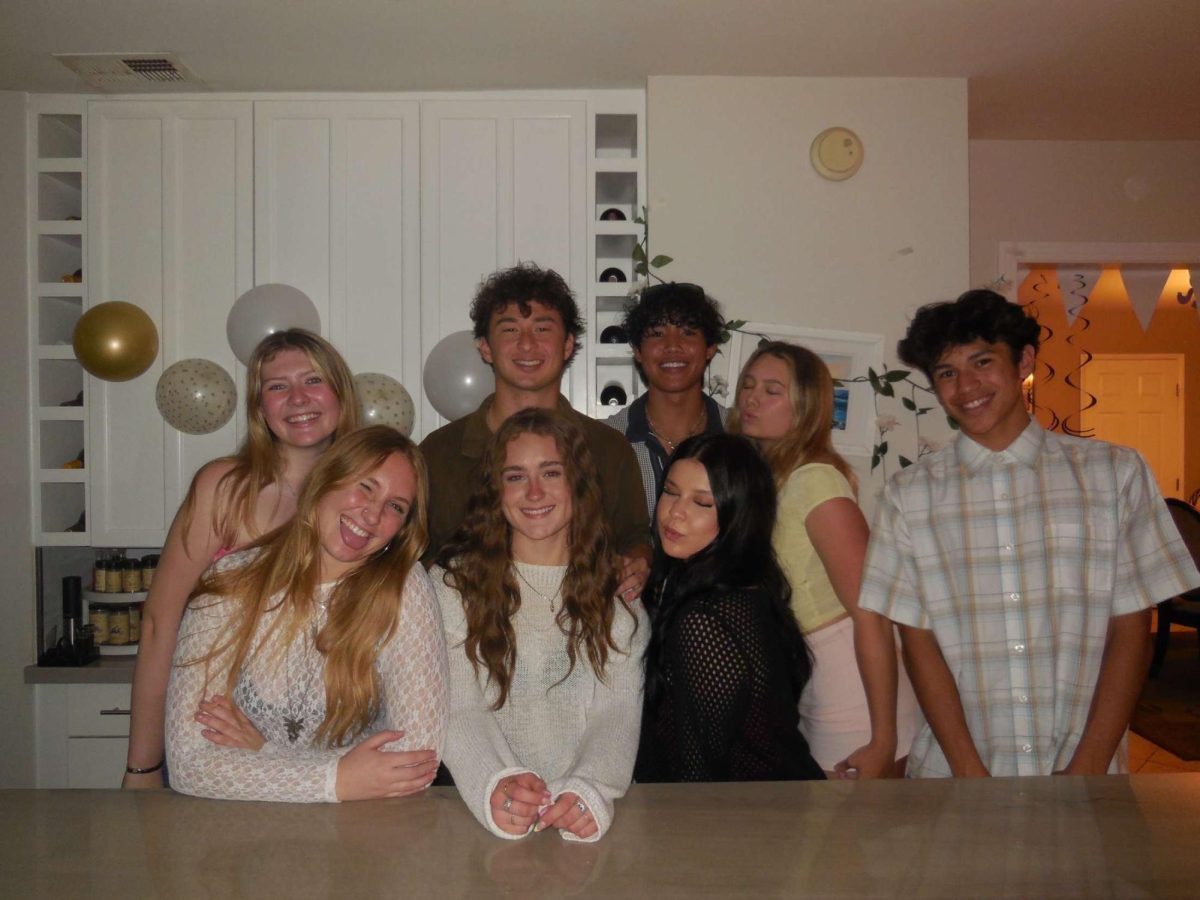On Dec. 21, Hozier will perform on the sketch comedy show, “Saturday Night Live” (“SNL”). Naturally, the Irish musician’s fans are thrilled. Hozier hosted the show once before, in 2014, thanks to his hit song “Take Me to Church.” Now, ten years later, he’s back – once again, thanks to his newest album.
Hozier’s third LP, “Unreal Unearth,” was released on August 18, 2023; the deluxe edition, including the songs of his several new singles and EPs, followed close behind and was released on March 22. Even more recently – Dec. 6, to be specific – “Hymn to Virgil” was made public, much to the joy of all Hozier supporters. For fans, it was no surprise that this album (and its tour) was magnificent. It was basically a part of the Hozier brand: the album takes about five years to create, but the result is like no other. Hit songs, such as “Too Sweet” and “Nobody’s Soldier” became popular amongst mainstream media, trending on many social media platforms. However, “Unreal Unearth” is much more than just two good songs; each track is drenched with a rich history, emotion, culture and innovative allusions (something that is not uncommon in his other works).

One of the main inspirations for “Unreal Unearth” is the epic poem “Inferno,” by Dante Alighieri. In the story, Dante is led by the poet, Virgil, through the Nine Circles of Hell: Limbo, Lust, Gluttony, Greed, Wrath, Heresy, Violence, Fraud, and Treachery. After meeting Satan, who is trapped in the frozen lake known as Cocytus, Virgil and Dante escape from Hell. They travel to Purgatory together and Dante is finally able to move on to Heaven. Hozier’s album makes wonderfully creative connections to this tale through its songs – which is something his fans greatly appreciate.
“When I see references and allusions to things like that [Dante’s “Inferno”], I get excited. And, also, it helps explain and convey the feelings that [Hozier] wants through things that match up with these older texts,” says Huntington Beach High School (HBHS) senior Francis Jacobs, a devoted fan of the Irish musician.
The first two songs in the album can be interpreted as the first circle of hell: Limbo, a place that is neither heaven nor hell. “De Selby (Part 1)” is a slow, haunting track meant to represent the experience of metamorphosis. The use of Gaelic to end the song on an almost ghostly note is genius, as the atmosphere is quickly picked up by “De Selby (Part 2).” The upbeat nature of this song allows the listener to feel a sort of freedom about being lost.
Both of these tracks are amazing at subtly referencing “Inferno” – and, consequently, the feeling of being in Limbo – while still maintaining its own originality. Moving through the album, the next song to directly show its relation to Dante Alghieri’s work is “Francesca.” This track acts as something a person damned in Lust would write to their lover – which is unsurprising since Francesca da Rimini is an actual character in “Inferno” who is damned to the Second Circle of Hell (she was also a real person whose love life inspired Dante).
Continuing on, the next song referencing “Inferno” is “I, Carrion (Icarian).” Interestingly enough, this song not only alludes to the epic poem, but also includes the Greek myth of Icarus. Both of these works are used in the same way: to shed light on Gluttony (the Third Circle of Hell). The story of Icarus is a tragedy containing an important lesson about knowing one’s limits. Gluttony, while it is most often brought up when describing someone eating a lot of food, can be used to describe an overindulgence of any kind. In the case of Hozier’s song, a greed for the love of another is being showcased.
Traveling to the Fourth Circle of Hell, Greed, the listener will find “Eat Your Young” – a parody of every corrupt person’s mindset. Hozier himself plays the part of a person drunk on power; he proudly lists the ways he works to receive money and control, the most obvious being the exploitation of children. As the listener progresses through Hell, they will meet “Who We Are” waiting for them in the fifth Circle of Hell, Wrath. Even though this song is not an extreme depiction of Wrath incarnate, the subtle hints throughout his lyrics express a type of bitter fury. The song shows an overall frustration with the human experience of hopelessly chasing an intangible dream until the very end.
Going on to Heresy, the Sixth Circle of Hell, one will stumble upon “All Things End.” This track is all about the fact that nothing lasts forever, but that doesn’t mean everything is meaningless – in fact, sometimes it is the only reason things have meaning. Heresy is the place where people who, while alive, had a contradicting belief to a major religion – most commonly Christianity – go when they die. “All Things End” describes a certain belief that while everything ends, everything also begins again. This means that one’s plan for their life shouldn’t change simply because one only has a short time on Earth – which is not a Christian belief. The song sort of goes against the Christian teachings, which is how it landed in the Circle of Heresy.

Marching forward, the listener then enters the seventh Circle of Hell known as Violence. This circle is where the solemn ballad “Butchered Tongue” resides. The song directly announces itself as a lament for the past Irish people who were forced to live under the Irish people were oppression of the British. During the 1700s, one way the British controlled Ireland’s freedom was by violently refusing to let them speak in their native tongue.
“During British rule, Gaelic was suppressed and its usage became associated with defiance,” says Theo Sullivan, a freshman at HBHS.
“Butchered Tongue” is about mourning the loss of a language meant to be dear to you, yet somehow feels foreign. The song reveals the violent nature of the British oppressors and how they prevented the people of Ireland from being connected to their language, thus relating to the Seventh Circle of Hell.
On a much lighter note, the next song in the album to reference “Inferno” is a comical twist on Fraud, the eighth Circle of Hell. “Anything But” may sound like a love song, but when one actually listens to the lyrics, they’ll realize that it is a depiction of one person who longs to be free attempting to (sort of) gently let down another person who is overly attached. This song, very obviously, is an expression of Fraud, as Hozier is not truly singing words of love and adoration, but instead words of kind rejection.
The final Circle of Hell is known as Treachery, the performance of fraudulent acts between bonded individuals. For Hozier, “Unknown/Nth” is the song that relates back to this circle. This track tells the story of someone who loves and trusts another dearly but keeps being betrayed by them. The perfect way to describe this song and its connection to Treachery is this specific lyric: “You called me angel for the first time, my heart leapt from me. You smile now, I can see its pieces still stuck in your teeth.” These vivid descriptions do a wonderful job of allowing the listener to truly envision the scene around them and feel the musician’s emotions. After this song, there is simply one more – “First Light.” This song connects to “Inferno” as the moment Dante finally escapes Hell and sees the light once again.
To be clear, “Unreal Unearth” has many more songs that are either less obviously related to “Inferno” – such as “Son of Nyx,” which is a song of grievance, and “Damage Gets Done,” which defends the younger generations from being blamed for all that is wrong with the current world – or they simply were made public after the initial release of the album – this includes “Empire Now,” which reveals the fact that it has been 100 years since most of Ireland officially became independent from the British Empire, and “Hymn to Virgil,” which is honestly the most blatant reference to “Inferno” in every version of the LP.
“Unreal Unearth” is magnificent thanks to the time and energy that went into creating it. Hozier went above and beyond while working on the album, as did the rest of his team. Extremely talented producers, writers, and instrumentalists strived to make this album memorable, and they did just that. So, while listening to the seemingly unending amount of tracks, make sure to appreciate just how much care went into making each and every song.
In the HBHS freshman Kaliana Jackson’s words: “I think that a lot of people need to appreciate him more because he has a really unique kind of music.”
Hozier is genuinely one in a million. For all the fans, remember to watch SNL on December 21, 2024, and – as always – continue to support the Irish musician in any way possible. If we’re lucky, 2029 will bring another album along with it.








